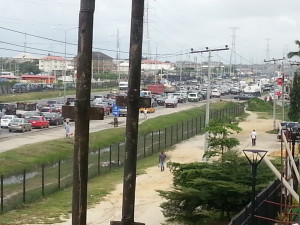Èkó ni olú ilú Nigeria fún ọ̀pọ̀lọpọ̀ ọdún ki àwọn Ijọba Ológun tó kó Olú Ilú Nigeria lọ si Abuja ni bi ọdún mẹrinlélógún sẹhin. Ki kó olú ilú kúrò ni Èkó kò din èrò ti o nwọ Èkó kù, ilú Èkó ngbòrò si ni, ṣùgbọn bi èrò ti npọ si, Ijọba àpapọ̀ kò ran Eko lọwọ nipa ipèsè owó tó tó ni àsikò fún ohun amáyédẹrùn.
Ká fi Èkó wé àwọn olú ilú yoku ni àgbáyé àti àwọn ilú nla ti omi yi ká, inira Èkó pọ̀ ju àwọn ilú wọnyi lọ. Kò si iná mọ̀nàmọ́ná ti ó ṣe deede, kò si omi mimu fún ará ilú pàtàki fún àwọn agbègbè titun. Eyi ti ó burú jù ni ki èniyàn jade, kó má mọ igbà ti ó ma padà wọlé nipa li lo bi wákàti mẹ́fà tàbi ju bẹ́ ẹ̀ lọ ninú sún kẹẹrẹ fa kẹẹrẹ ọkọ̀, nitori ọ̀nà kò tó, bẹni kò dára, iwà-kuwà pọ̀ fún awakọ̀, ọkọ̀ àti èrò pọ̀ ju òpópó ọ̀nà lọ.
Bi Ijọba àpapọ̀ Nigeria ti ri owó ori gbà ni Èkó ju gbogbo àwọn ilú yoku lọ tó, kò si irànlọ́wọ́ lati tú ọ̀nà Ijọba àpapọ̀ ṣe. Ni ọ̀pọ̀lọpọ̀ ọdún sẹhin, Ijọba Ológun di Èkó lọ́wọ́ lati pèsè ọkọ̀ ojú irin ti ó ngbé èrò púpọ̀ ti Gómìnà Lateef Jakande bẹ̀rẹ̀. Bi Èkó ti tóbi tó, ibùdókọ òfúrufú kan ló wà lójú kan naa ni Ìkẹjà fún àwọn ti ó nlọ si gbogbo àgbáyé àti àwọn ti ó fẹ́ lọ si ilú Nigeria miran. Lati igbà ti Ijọba Ológun ti lé àwọn àjòjì ti ó dá ilé ọjà nla silẹ fún ọ̀pọ̀lọpọ̀ ọdún, àwọn Olówó ilú kò ronú lati ṣe irú ilé ọjà bẹ́ ẹ̀ si gbogbo agbègbè Èkó fún irọ̀rùn ará ilú ju bi gbogbo ọjà nla ti kó ori jọ si Erékùṣù Èkó. Àwọn nkan wọnyi àti iwà ibàjẹ́ àti ojúkòkòrò Ijọba Ológun àti Alágbádá (Òṣèlú) ló sọ Èkó di aginjù laarin àwọn olú ilú àgbáyé.
A lérò wi pé Ijọba Òṣèlú ti àwọn ará ilú yàn fún “àyipadà” kúrò ninú iwà ibàjẹ́ tó gba orilẹ̀ èdè kan fún igbà pi pẹ́, yio wa àtúnṣe fún Èkó. Gómìnà Akinwunmi Àmbọ̀dé ni lati wá àtúnṣe si iyà ti ojú ará ilú nri nipa gbi gbé ọkàn lé ọkọ̀ ilẹ́ fún ohun irinna nikan, nipa pi pari iṣẹ́ ọkọ̀ ojú irin àti ibùdókọ̀ ojú omi ti Ijọba Gómìnà Babátúndé Raji Fáṣọlá bẹ̀rẹ̀, ki wọn si ṣe kun nipa ipèsè ibùdókọ òfúrufú àti ohun amáyédẹrùn yoku.
“Èkó kò ni bàjẹ́ o – ó bàjẹ́ ti”.
ENGLISH TRANSLATION
Lagos was the Nigerian capital for many years before the Military moved the capital to Abuja about twenty-four years ago. Moving the capital away from Lagos has not reduced the population, rather Lagos has continued to expand but in spite of the increase in population and expansion, the Federal Government has not assisted Lagos in terms of releasing enough budget timely for the provision of infrastructure.
Comparing Lagos with the other big Cities in the world and Cities that are surrounded by water, the hardship in Lagos is more. No stable power supply, no portable water for the people particularly in new settlements. The worst is the fear of going out without knowing when to return because one can spend six or more hours in the terrible vehicular traffic because of shortage in the network, bad road and indiscipline by drivers, less road network for many vehicles and over population.
Despite the huge tax revenue received by the Federal Government far and above any other City in Nigeria, there is neglect of the Federal roads. Many years ago, efforts made by Governor Lateef Jakande to provide Rail Road as a means of moving the masses was thwarted by the Military junta. As big as Lagos is, there is only one Federal Airport, both local and international were located in Ikeja for all international and local travels. Since the Military Government indigenised the foreign shopping malls (Kingsway, Leventis, UTC etc), no indigenous rich ones could think of investing on shopping malls to decongest concentration of expansive markets in Lagos Island. All these and corruption, greed by both the Military and Civilian Governments has turned Lagos to the jungle among other World Cities.
It is hoped that the Democratic Government elected based on Nigerians quest for “Change” from corruption that has evaded the Country for years will get to work for the good of Lagos and Nigerians. Governor Akinwunmi Ambode should seek a solution to reduce people’s suffering as a result of dependence on only road transportation by completing the Rail project and Jetties began by his predecessor Governor Babatunde Raji Fasola, and do more by embarking on the provision of a second Airport and other basic infrastructure.
“Lagos will not be destroyed – indestructible”.
Originally posted 2015-12-15 20:33:21. Republished by Blog Post Promoter



